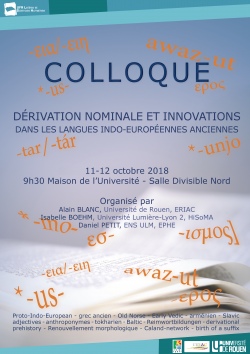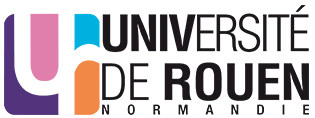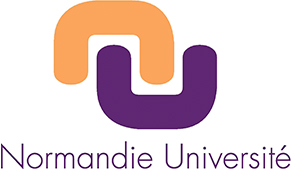Dérivation nominale et innovations dans les langues indo-européennes anciennes
Horaire : 09h00-17h30
Lieu : Maison de l'Université | Mont-Saint-Aignan
Organisé par
- Alain Blanc, Université de Rouen Normandie, ERIAC
- Isabelle Boehm, Université Lumière-Lyon 2, HiSoMA
- Daniel Petit, ENS Ulm, EPHE
PROGRAMME
Jeudi 11 octobre 2018
09h30 – Allocution de Monsieur Miguel Olmos, directeur de l’équipe de recherche ERIAC
09h45-10h15 – Éric Dieu (MCF, Université de Toulouse), Loi de Wheeler et dérivation nominale en grec ancien.
10h20-10h40 – Pause
11h40-11h10 – Katsiaryna Ackermann (Wien), The pathways of the Caland-networks: Some notes on the interrelation of the adjectival, the nominal and the verbal realizations of the same notions of the natural world.
11h15-11h45 – Charles de Lamberterie (Institut de France), Études morphologiques arméno-grecques.
12h00 – Déjeuner
13h45-14h15 – Sophie Minon (EPHE, Paris), La distribution de -ᾱ– et de -ο- dans les anthroponymes en Ἀγορα-, -αγόρᾱ(ς), -ήγορος, du mycénien au VIe siècle de notre ère.
14h20-14h50 – Brent Vine (University of California, Los Angeles), Latin fimus/fimum ‘dung’ and PIE Secondary *-mo-.
14h55-15h05 – Pause
15h05-15h35 – Rosemarie Lühr (Université Humboldt de Berlin), Zur Semantik der vedischen Nomina agentis auf -tar und -tár.
15h40-16h10 – José Luis García Ramón (Prof. Dr., Harvard Center for Hellenic Studies, Washington), Noms d’action : continuité, renouvellement formel et de contenu, grammaticalisation.
16h15-16h25 – Pause
16h25-16h55 – Daniel Petit (ENS Ulm, EPHE), Anti-Sievers in Baltic.
17h00-17h30 – Liana Tronci (Université pour Étrangers de Sienne), Le renouvellement morphologique par la réanalyse : le cas des suffixes grecs -ισμός et -ιστής.
Vendredi 12 octobre 2018
09h00-09h30 – Audrey Mathys (Fondation Thiers), Reimwortbildungen et productivité en grec ancien : quelques exemples.
09h35-10h05 – Lucien van Beek (Leiden University), Adjectives in -ερόςin Homer and beyond : origins and derivation patterns.
10h10-10h20 – Pause
10h20-10h50 – Marek Majer (Université de Łódź), Slavic i-stem adjectives and their alleged inflection loss : the derivational prehistory and synchronic status of a category.
10h55-11h25 – Birgit Anette Olsen (University of Copenhagen), The birth of a suffix – the Greek Type ἱππεύς and related formations.
11h30-12h00 – Romain Garnier (Université de Limoges, IUF), Nouvelles réflexions sur les neutres en *-us- : un suffixe résiduel.
12h05-13h45 – Déjeuner
13h45-14h15 – Riccardo Ginevra (Université de Cologne), Old Norse -yn and Proto-Germanic *-unjo, a residual suffix class : reanalysis and spread of derivational morphology through semantic association.
14h20-14h50 – Georges-Jean Pinault (EPHE, Paris), Regard comparatif sur la dérivation nominale en tokharien.
14h55-15h05 – Pause
15h05-15h35 – Stefan Höfler (Harvard University), Innovation et archaïsme dans la formation d’adjectifs possessifs dérivés des thèmes en -s- en indo-européen.
15h40-16h10 – Alcorac Alonso Déniz (CNRS – HiSoMA), Le développement historique des suffixes ‑ειᾰ/‑είᾱ/‑είη (att. ὑγίεια/ὑγιείᾱ, ion. ὑγιείη ‘bonne santé’) et ‑οιᾰ/‑οίᾱ/‑οίη (att. εὔπλοια, ion. εὐπλοίη ‘bonne navigation’) en grec ancien.
16h15-16h45 – Alain Blanc (Université de Rouen-Normandie) et Isabelle Boehm (Université Lyon 2), La productivité du suffixe -εσ- en grec dans la langue de la Collection hippocratique.
16h50-17h00 – Alain Blanc, Isabelle Boehm, Daniel Petit : clôture du colloque
CONTACT
INSCRIPTION
| Enseignants – Public (50 €) : Site d’inscription
| Doctorants extérieurs (20 €) : Site d’inscription






